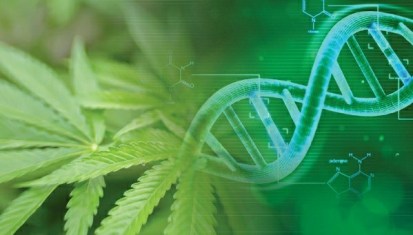Researchers have linked cannabis to epigenetic changes, according to a new study published in Molecular Psychiatry.
The study looked at over 1,000 adults and found an association between cannabis use and changes in epigenetic markers.
Of course, the study didn’t establish cause and effect. Does cannabis directly cause these changes? Are these changes known to cause health problems?
Even the study’s authors admitted the study’s limitations. “Additional studies are needed to replicate and verify these findings,” said Lifang Hou, MD, Ph.D.
So what did the study find? And what relevance is there for cannabis connoisseurs?
Cannabis Linked to Epigenetic Changes: Details
Researchers analyzed blood samples taken five years apart from people who had participated in a previous study.
The researchers surveyed each participant for recent cannabis use but assumed cumulative use numbers. They then performed DNA methylation profiling to reveal epigenetic changes.
This profiling involves isolating DNA from blood cells and examining the methylation status across the genome.
Researchers have used this method to identify epigenetic changes associated with cancer and neurological disorders.
By studying changes in DNA methylation, the researchers linked cannabis use to changes in the human epigenome.
But what does it mean to link cannabis to epigenetic changes?
The changes involve pathways associated with mental health disorders such as schizophrenia, bipolar disorder, and substance use disorders.
Is this the proof reefer madness busybodies have been looking for?
The researchers are cautious. As one of them said:
Additional studies are needed to determine whether these associations are consistently observed in different populations. Moreover, studies examining the effect of marijuana on age-related health outcomes may provide further insight into the long-term effect of marijuana on health.
How Important Are Epigenetic Factors?
Suppose future studies replicate and verify these findings. Does that mean cumulated cannabis use over time causes mental health problems?
What does it mean to link cannabis with epigenetic changes?
Science writer John Horgan has been on a decades-long crusade against scientists who overemphasize epigenetic factors in their research.
Horgan’s argument boils down to three points:
Reductionism: Researchers tend to adopt a reductionist approach when studying genes. They oversimplify complex biological systems. They attribute everything to genes and genetic factors. Often, this can result in neglecting interactions between genes, epigenetic modifications, and environmental influences.
Researchers may find the epigenetic changes linked to cannabis don’t hold up in future studies. Or that the changes have nothing to do with mental wellbeing.
Complexities: Genes are essential in determining many aspects of a human being, but humans are incredibly complex. Focusing on genes while ignoring broader contexts hinders scientific progress. How do genes interact with other factors shaping an individual’s personality or disease susceptibility?
Nature vs. Nurture: Ultimately, this comes down to the nature vs. nurture debate. Genes and the environment are intertwined. Exclusively focusing on one over the other leads to an incomplete picture.
Do Your Genes Cause Mental Health Problems?
Researchers have linked cannabis to epigenetic changes involving pathways such as substance use disorder. So if you have “cannabis use disorder,” the problem is your genes.
But this is a cop-out. It’s another way for doctors to prescribe pharma-patented meds under the guise of “public health.”
To quote Horgan,
The abysmal record of behavioural genetics stems from two factors. First, the quest for correlations between thousands of genes and thousands of traits and disorders is prone to false positives, especially when traits are as squishy as “aggression” and “childhood trauma”… Second, the media—including respected scientific journals like Science and PNAS as well as shows like Dr. Phil—are prone to hyping “discoveries” that will attract attention.
In the early 2000s, you couldn’t turn on the TV or read a newspaper without hearing about pseudo-discoveries of “genes.”
There was the liberal gene, gay gene, warrior gene, religious gene, alcoholism gene, and high-IQ gene. Even some Austro-libertarian scholars have speculated on a “libertarian” gene.
Proponents of the theory have updated their narrative. Some may call it “moving the goalposts.” Now researchers talk about a “cluster” of genes.
So what does this latest study tell us?
Researchers linked cannabis to epigenetic changes similar to tobacco. They speculate the changes are also associated with substance use disorder and other mental health problems.
But how do epigenetic changes override people’s thoughts?
A correlation between thousands of genes and traits tells us nothing. Especially when the terms are ambiguous. Even if you settle on an objective definition, you have the problem of correlating false positives with something they’re not.
These studies reinforce the idea that individuals are biologically fine-tuned homogeneous blobs. That we must act and behave in certain ways and think specific thoughts based on our genetic programming.
It’s pseudoscience.
- SEO Powered Content & PR Distribution. Get Amplified Today.
- PlatoData.Network Vertical Generative Ai. Empower Yourself. Access Here.
- PlatoAiStream. Web3 Intelligence. Knowledge Amplified. Access Here.
- PlatoESG. Automotive / EVs, Carbon, CleanTech, Energy, Environment, Solar, Waste Management. Access Here.
- BlockOffsets. Modernizing Environmental Offset Ownership. Access Here.
- Source: https://cannabislifenetwork.com/cannabis-linked-to-epigenetic-changes-study/
- :has
- :is
- :not
- $UP
- 000
- 1
- 11
- 8
- a
- About
- According
- across
- Act
- admitted
- adopt
- adults
- against
- also
- an
- analyzed
- and
- Another
- apart
- approach
- ARE
- argument
- AS
- aspects
- associated
- Association
- associations
- assumed
- At
- attention
- attract
- authors
- based
- been
- behave
- being
- between
- blood
- broader
- but
- call
- CAN
- Cancer
- cannabis
- Cause
- causes
- cautious
- Cells
- certain
- Changes
- comes
- complex
- contexts
- correlating
- Correlation
- correlations
- course
- debate
- definition
- Determine
- determining
- DID
- different
- directly
- Disease
- disorder
- disorders
- dna
- do
- Doctors
- does
- Dont
- down
- each
- Early
- effect
- Environment
- environmental
- especially
- essential
- establish
- Even
- everything
- Examining
- exclusively
- factors
- false
- Feinberg
- Find
- findings
- First
- five
- focusing
- For
- found
- from
- further
- future
- Genetics
- genome
- guise
- had
- Have
- Health
- hearing
- hinders
- hold
- How
- HTTPS
- human
- Humans
- idea
- identify
- if
- important
- in
- incredibly
- individuals
- insight
- interact
- interactions
- into
- involve
- involves
- involving
- IT
- John
- jpg
- known
- latest
- Leads
- limitations
- LINK
- linked
- long-term
- looked
- looking
- many
- marijuana
- max-width
- May..
- mean
- mental
- Mental health
- method
- Modifications
- Moreover
- must
- NARRATIVE
- Nature
- needed
- neglecting
- New
- nothing
- now
- numbers
- nurture
- objective
- observed
- of
- often
- on
- ONE
- or
- Other
- our
- outcomes
- over
- overemphasize
- override
- participated
- People
- people’s
- performed
- Personality
- picture
- plato
- Plato Data Intelligence
- PlatoData
- points
- populations
- prescribe
- previous
- Problem
- problems
- profiling
- Programming
- Progress
- proof
- provide
- published
- quest
- Read
- recent
- record
- reinforce
- relevance
- research
- researchers
- respected
- result
- reveal
- Said
- Scholars
- scientific
- scientists
- Second
- settle
- shaping
- Shows
- similar
- So
- some
- something
- specific
- Status
- stems
- studies
- Study
- Studying
- substance
- such
- surveyed
- Systems
- taken
- Talk
- tell
- tells
- terms
- that
- The
- their
- Them
- then
- theory
- There.
- These
- they
- Think
- this
- thousands
- three
- time
- to
- TURN
- tv
- two
- under
- updated
- us
- use
- used
- verify
- vs
- was
- Way..
- ways
- we
- WELL
- wellbeing
- What
- when
- whether
- while
- WHO
- will
- with
- without
- writer
- years
- you
- Your
- zephyrnet














